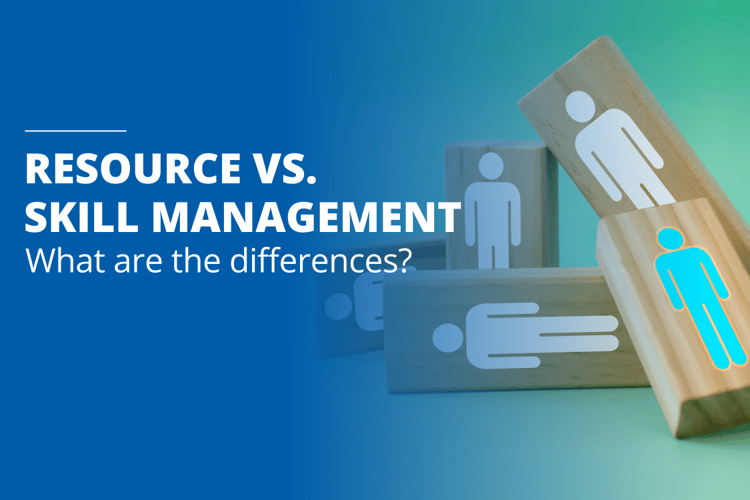Why Do Projects Fail? 5 Common Reasons - And How to Avoid Them
Projects are often complex, and even with the best intentions and a competent team, success can elude us. But why do so...
Whether using agile or classic methods, each of your projects can only be as good as the people who work on it. So why should you settle for pure resource management when you can also have skills management?

We explain why skill management is the sensible evolutionary stage of resource management, where the differences lie and what the prerequisites are for effectively deployed skill management.
Anyone who believes that their projects can get by without resource management has probably never experienced what a lack of resources can cause ... In fact, good project management is hardly conceivable without associated resource management. This is also shown by the definition you can find at Wikipedia: "Resource management as part of project management serves to identify and allocate project participants (resources) and to use them as efficiently as possible." Resource management is of particular importance in multi-project management and spans a strategic, an operational and a tactical dimension. The tactical element includes staffing, in which you assign project roles to previously identified resources. This resource planning thus assigns those people to your project who will face its challenges and make it reach its goal. Resource management then takes care of the appropriate distribution of resources during the course of the project, reacts to changes and ensures optimal staff deployment.
In small projects and manageable large teams, project management is usually well informed about the individual (potential) team members. They know each other and know where the skills, competencies and social abilities of the individual employees lie. Thus, up to a certain complexity, even powerful and success-oriented project teams can be put together. However, as a company grows in size - or even in multi-project management - this casual method quickly reaches its limits. When initially assembling teams, you may still have the time to talk to potential members of your team (or their superiors). But when additional resources have to be organized as quickly as possible in the hectic day-to-day project work, it soon becomes all about the resource itself. There is no time to assess skills and abilities.
In the worst case, this can lead to you staffing project teams incorrectly, which can seriously disrupt projects. In short: As soon as your projects are no longer small and manageable, you should get yourself a skills management system. And you know yourself how quickly a project can become large and complex ...
Now that's a bit of a stretch, but: with skill management, you're not just identifying resources, you're identifying the skills (and maybe even superpowers) that your project needs right now. To use an image: With bare resource management, you help yourself to a large drawer of resources when performance is needed and hope you don't miss. Resource management with skill management, on the other hand, doesn't provide you with an unsorted drawer, but a toolbox of precision tools. Each drawer is neatly labeled, and you can immediately find the skills you need.
You've probably already guessed: It's not quite easy to optimize your resource management in this way. To stay with the image: It does take a bit of patience until you have put together a well-sorted toolbox. Besides, we're not talking about tools here, of course, but about people. And they don't always like it when you evaluate and categorize them.
Before you enrich your project management with skills management, you need to get all employees on board with this concept. You have to convey to them that the assignment of skills does not represent a value judgement, but rather makes it possible to staff projects throughout the company in a way that is both project-serving and motivating. Using one's own skills in the right team and being in the right place at the right time for a project is not only positive for the company, but simply makes project work more enjoyable!
In addition, any missing hard or soft skills are also a very good incentive to close existing skill gaps with targeted training or workshops.
Skill Management is a function that is integrated into the Can Do project management software. This makes it easy for project managers to assemble the ideal fit Dream Team for any project. Here are some of the features and benefits:
Learn more about Can Do's resource management and skills management on our features page.
It has already been discussed above: In manageable teams and objects, your own skills also and above all come into play - you know your people and their skills and therefore usually know yourself exactly which teams work well. With Skill Management, you succeed in transferring this skill to larger project environments, so to speak. Even in multi-project management, thanks to Can Do, you don't simply select resources - but the capable ones for your projects.
Want to know more about what skill management means in Can Do? Feel free to contact us!
Michael Fenske works as a freelance author for Can Do GmbH.
Projects are often complex, and even with the best intentions and a competent team, success can elude us. But why do so...
Cost-cutting is currently at the top of the agenda for many companies. In the face of economic uncertainty and rising...
At Can Do, we attach great importance to the exchange with students and the opportunity to share our knowledge of...